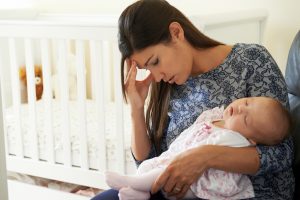 Women with urinary incontinence are more likely to experience depression, including postpartum depression. For the study, researchers followed middle-aged women with incontinence and found they are more likely to develop depression, compared to middle-aged women without incontinence.
Women with urinary incontinence are more likely to experience depression, including postpartum depression. For the study, researchers followed middle-aged women with incontinence and found they are more likely to develop depression, compared to middle-aged women without incontinence.
Researcher Jodie Avery said, “Women with both incontinence and depression scored lower in all areas of quality of life because of the impact of incontinence on their physical wellbeing. Key issues for younger women affected by incontinence are family, sexual relationships, and sport and leisure activities… The most common difficulties women express about their incontinence are things like: ‘I can’t play netball’, ‘I can’t go to the gym’, ‘I can’t go for walks’, or ‘I can’t go dancing’, and these are real issues for women who are still in the prime of their lives.”
Advertisement
Urinary incontinence affects roughly 35 percent of women, with pregnancy being the primary cause. The more children a woman has, the greater her chances are of developing urinary incontinence.
Avery added, “Our studies show that 20 percent of the incontinent population has depression, and this is something that we need both sufferers and GPs to better understand. Sufferers of incontinence are often reluctant to get help, but attitudes are slowly changing. It is very important for them to seek advice about their condition. In some cases, urinary incontinence can be curable with an operation, and this is quite literally a life-changing operation for many women. GPs need to be aware that if their patient is suffering from incontinence, this condition is often linked with depression which needs to be treated to increase their quality of life.”
“Ultimately, we hope that our research helps to raise awareness in the community about both the mental and physical issues associated with incontinence. We know it’s embarrassing, but if you discuss it with your GP, your life really can change,” Avery concluded.
Women with urinary incontinence are almost twice as likely to develop postpartum depression: Previous study
Women with urinary incontinence are almost twice as likely to develop postpartum depression, compared to women without the condition. The previous study was carried out by the researchers at McMaster University in Canada. The researchers evaluated nearly 1,900 new mothers. One-third of the subjects underwent C-section delivery.
Advertisement
Nearly eight percent of the participants developed postpartum depression six weeks after discharge. The five strongest predictors of postpartum depression are being younger than 25 years of age, being readmitted into hospital, non-initiating breastfeeding, good, fair, or poor postpartum health, and urinary incontinence or involuntary urination.
Lead researcher Wendy Sword said, “We were surprised to find that urinary incontinence is a risk factor for postpartum depression. Urinary incontinence following childbirth has not received much attention as a factor contributing to postpartum depression, and we do not yet fully understand the reasons incontinence is linked to depression.”
Sword stresses that importance of talking to your doctor about incontinence as there are treatment options available to relieve the condition.
